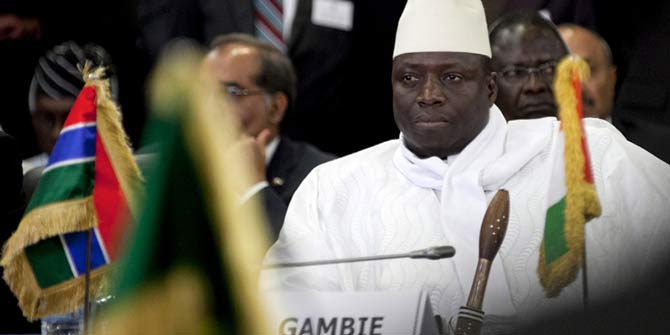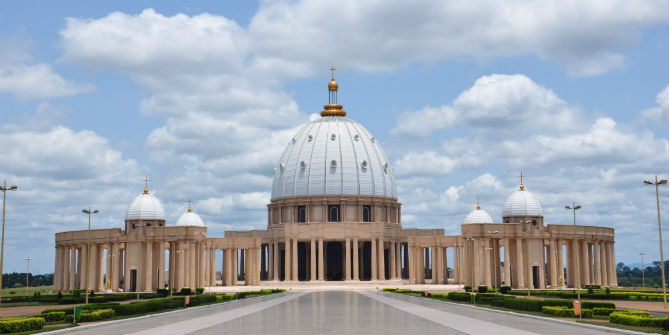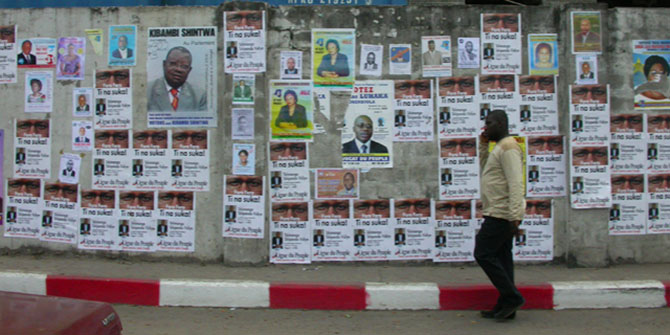Olivier Bucyana is a Masters student at LSE. It’s very much election season in Africa with people in Zambia, Liberia, Cameroon and Tunisia going to the polls. However Oliver argues there is a long way to go before elections in Africa are truly democratic.
The term “democracy” has been widely used the past several months. In fact, it has been frequently used over the past two years by politicians and international organisations, mainly due to the unprecedented number of presidential elections in Sub-Saharan Africa.
Many of these elections ended with opposition parties contesting the results and calling for free and fair elections. This leads us to ask several questions: How does one determine whether an election has been truly democratic? What are the characteristics of a democratic election? How does one determine whether an election has been “free and fair”?
In a truly democratic election, one citizen equals one vote. In addition, academics and politicians point out that transparency is an important characteristic of a free and fair election. In other words, in order for an election to be democratic, every citizen has to have an equal say in electing an individual to political office and in order for this to be possible, education is key.
As one of the pillars of democracy, education increases political literacy. It also allows citizens participating in elections to be aware of each candidate’s programme, which in turn enables them to choose who they believe will take their country in the right direction.
However, when one looks at the levels of education in some sub-Saharan African countries, one can’t help but wonder if some of these elections are truly democratic.
For instance, in late July this year, President Obama invited four African heads of state to Washington DC whom he described as leaders “elected through free and fair elections”[1]. They were the leaders of Benin, Cote d’Ivoire, Guinea (Conakry) and Niger. However when one looks at the levels of education in these four countries, one wonders whether elections in these specific countries can be characterised as democratic.
According to World Bank data, the literacy rate of adults (percentage of people aged 15 and above) in Benin, as of 2009, was only 42%[2] and in Cote d’Ivoire the literacy rate was 55%[3]. As for Guinea and Niger, only 39%[4] and 29%[5] (in 2005) respectively could read and write.
When it comes to elections, the African Elections Database reports that in Benin, 84.8%[6] of the population participated in the presidential elections. In Cote d’Ivoire, depending on whether one believes the Electoral Commission or the Constitutional Council, the turnout for the 2011 elections, which the BBC described as “historic”[7], was either 81.1% or 71.3%[8]. In Guinea (Conakry), the African Elections Database reports a turnout of 67.9%[9] and in Niger a turnout of 49%[10].
Keeping the levels of education constant, statistically speaking, there is a probability that more than half of the individuals who voted in Benin, Guinea and Niger could neither read nor write. How can such elections be deemed democratic? The elections may have been free if there was no fraud, but were they fair?
Although low levels of education is only one of the issues African governments must address today, addressing it will certainly make electoral processes more free and fair. Furthermore, it is important to note that investing in education is investing in human capital and although it is only one step, it is the right path towards alleviating the levels of poverty many African countries are facing today.
[1] The White House Blog, President Obama Meets with Leaders of Nations Representing Africa’s Democratic Progress, http://www.whitehouse.gov/blog/2011/07/29/president-obama-meets-leaders-nations-representing-africa-s-democratic-progress(July 29, 2011)
[2] World Bank, Benin Data, http://data.worldbank.org/country/benin?display=graph
[3] World Bank, Cote d’Ivoire Data, http://data.worldbank.org/country/cote-divoire?display=graph
[4] World Bank, Guinea Data, http://data.worldbank.org/country/guinea?display=graph
[5] World Bank, Niger Data, http://data.worldbank.org/country/niger?display=graph
[6] African Elections Database, Elections in Benin, http://africanelections.tripod.com/bj.html#2011_Presidential_Election
[7] BBC, ‘Historic’ turnout in Ivory Coast’s presidential poll, http://www.bbc.co.uk/news/world-africa-11664197 (1st November 2010)
[8] African Elections Database, Elections in Cote d’Ivoire, http://africanelections.tripod.com/ci.html#2010_Presidential_Election
[9] African Elections Database, Elections in Guinea, http://africanelections.tripod.com/gn.html#2010_Presidential_Election
[10] African Elections Database, Elections in Niger, http://africanelections.tripod.com/ne.html#2011_Presidential_Election






2 Comments